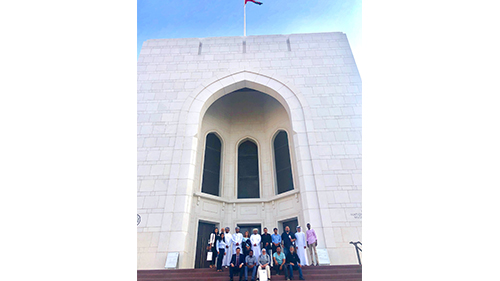30 September 2018
The Arab Regional Centre for World Heritage Organizes a Workshop for Arab Heritage Experts in Oman
Urban Expansion and World Heritage Sites Highlighted


The Arab Regional Centre for World Heritage, in collaboration with the Ministry of Heritage and Culture in the Sultanate of Oman, alongside ICCROM and IUCN, organized a training workshop from 23- 27 September 2018, on Heritage Impact Assessment (HIA) and Environmental Impact Assessment (EIA) concepts in the field of the UNESCO World Heritage Convention. Indeed, The UNESCO World Heritage Committee has observed that many activities such as tourism, infrastructure development, new buildings, urban renewal and changes to the land use being undertaken in and around World Heritage sites may have negative impacts on the Outstanding Universal Value (OUV).
A total of 11 Arab States benefited from the workshop and enhanced their understanding of main concepts and mechanisms of the 1972 World Heritage Convention, including conservation, management and protection in conjunction to the topic of Impact Assessment in cultural and natural sites. The participants were introduced to the ICOMOS HIA Guideline and the IUCN EIA Advice Note, in order to be able to apply these approaches to the case study of the 2018 inscribed World Heritage site, Ancient City of Qalhat, in Oman, which was the central focus during the workshop. Each group then presented their findings. While recognizing the vital role of such activities for providing benefits to the society, the workshop has stressed the need to undertake Impact Assessment studies, in order to assess the potential negative and positive impacts on heritage sites. As part of its mandate to build capacities of State Parties to the World Heritage Convention. It focuses on promoting links between people-nature-culture in the management of heritage places and securing for heritage a more dynamic role in wider sustainable development. One of the key modules of the Programme is impact assessment, which aims to build the capacity to efficiently use impact assessment tools to support heritage conservation actions. The Programme will work on adapting methodologies and standards for assessing impacts on World Heritage sites specifically and conduct diverse capacity building activities.
The workshop took place in Muscat, Oman and was a pioneering experience in the Arab Region since it brought a number of representatives and site managers of cultural, natural and mixed World Heritage sites together, and provided them with a unique opportunity to learn and share their expertise on the topic of World Heritage Impact Assessments. During a field visit to the Ancient City of Qalhat, adopted by the 42nd World Heritage Committee Meeting held in Bahrain last June- July, participants were divided in working groups to draft a HIA and EIA of this site.
Because this topic is one of the recurring needs of conservation of World Heritage sites, this workshop is considered an integral component to ARC-WH’s strategic objective to strengthen the culture and nature interlinkages for its regional programme for World Heritage, and will be followed by future in-depth HIA-EIA activities in the Arab Region.







